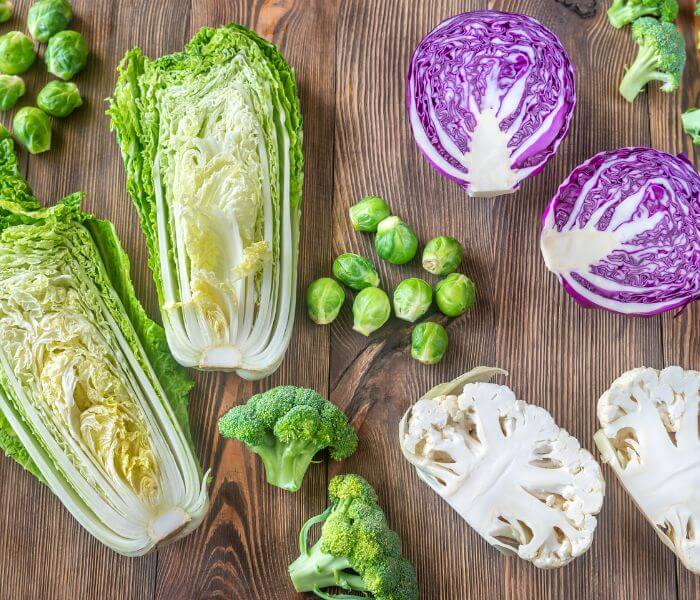4 mins read
Which vegetables help with hormone balance?

No matter how much we know about healthy eating, the advice to ‘eat your greens’ has probably been cemented in our consciousness for as long as we can remember. Well, this is solid advice, and cruciferous vegetables, which are the focus of this article – boast a wealth of nutritional goodness.
Low in calories and rich in a wide range of nutrients, cruciferous vegetables contain high levels of vitamin C, vitamin E, and vitamin K; carotenoids such as beta-carotene and lutein; folate and minerals including magnesium, calcium and iron, as well as a substantial dose of fibre, which is essential for weight management and protecting the cardiovascular system, both of which become more important as we reach our menopause years.
What are cruciferous vegetables?
Cruciferous vegetables are part of the brassica family and named from the Latin word ‘Cruciferae’ meaning ‘cross-bearing’, as their four-petal flowers resemble the shape of a cross. There are approximately 3,000 different species, including the following everyday ingredients:
- Rocket
- Watercress
- Swiss chard
- Bok choi
- Broccoli
- Brussel sprouts
- Cabbage
- Cauliflower
- Kale
- Radish
- Turnip
Cruciferous vegetables are known as ‘functional foods’ as they provide benefits beyond their basic nutritional value, this is due to a group of phytochemicals called glucosinates that are responsible for their bitter flavour and released when they are cut, chewed or cooked.
Health benefits of cruciferous vegetables
There have been many research studies into the health benefits of cruciferous vegetables, such as maintaining hormone balance and cancer prevention. Certain compounds have been shown to protect against chronic disease including sulforaphane in cardiovascular disease [1]-[2], and isothiocyanates (ITC) and indole-3-carbinol (IC3) in decreasing the risk of DNA damage and hormone-responsive tumours (e.g breast and prostate cancers)[3][4]. In addition, high levels of calcium, especially in broccoli, kale and Chinese cabbage, mean a diet rich in cruciferous vegetables can help to prevent the onset of osteoporosis.
Link to hormone balance
Health conditions due to an imbalance in oestrogen are common, including dysmenorrhoea (painful menstruation), endometriosis, fibroids, Premenstrual Syndrome (PMS) and Polycystic Ovary Syndrome (PCOS), and during perimenopause and the menopause levels fluctuate dramatically.
Oestrogen metabolism is influenced by genetics, lifestyle, diet, and the environment, and is managed by the liver.
The liver performs more than 500 tasks to keep us healthy, including working as the body’s filtration system, neutralising and detoxifying substances like alcohol, caffeine, medicines, environmental toxins and ‘spent’ hormones such as oestrogen.
The liver has 2 stages of detoxification:
- Phase 1: the first line of defence is reliant on a group of enzymes called cytochrome P450 which protect cells from damage by converting toxins into smaller, less harmful substances and making them water-soluble. During this phase oestrogen is broken down into three main metabolites; 4- hydroxyestrone and 16α- hydroxyestrone which are linked to oestrogen related problems in the body, and 2-hydroxyestrone which is thought to be protective [5].
- Phase 2: During this phase, oestrogen, as well as other waste products are bound to compounds that help them to flush through the liver in bile, urine and stools.
Some nutrients can provide targeted support in phase 1 or phase 2, but cruciferous vegetables support detoxification at both stages by supplying sulfur and indole-3-carbinol.
Improving liver function
Strengthening liver function nutritionally, we can help to channel oestrogen metabolites down the protective 2-hydroxyestrone pathway, giving our bodies the best chance to eliminate excess oestrogen and maintain hormone balance.
Studies suggest that compounds in cruciferous vegetables may prevent or inhibit breast cancer development by modulating the activity of phase 1 and phase 2 enzymes, inhibiting cell proliferation, regulating the expression of oestrogen receptors, altering the metabolism of oestrogen, or suppressing inflammatory enzymes [6]. One study found that consumption of broccoli was inversely associated with breast cancer risk in pre-menopausal women [7].
Oestrogen can promote the growth of tumours, and this is where indole-3 carbinol has further benefits, it is broken down to a compound called diindolylmethane (DIM) which favours oestrogen metabolism in women, increasing sex hormone clearance in the liver, limiting tumour cell growth and promoting apoptosis (cell death), thereby reducing the risk of pre-menopausal breast cancer [8].
Supporting oestrogen balance
There are many other dietary factors which can help to manage oestrogen balance, including fibre, omega 3 fats, vitamin D, vitamin E, B vitamins, zinc, magnesium, probiotics, phytoestrogens (plant based oestrogens), isoflavones (in soya, flaxseed and legumes) and calcium-D-glucarate (found in small amounts in certain fruit and veg or taken in supplement form).
But back to the green stuff, aim to have at least one serving of cruciferous vegetables each day, look for firm, dark green leaves or heads, and discard those that are yellow, keep in the refrigerator or cook directly from frozen.
*A word of caution if you have thyroid issues – it’s important to know that cruciferous vegetables contain something called ‘goitrogens’ which can interfere with the production of thyroid hormones, however cooking reduces their potency.
Author: Becky Graham Nutritionist BA(Hons) Dip ION mBANT
Article references
This information has been medically reviewed by Dr Thom Phillips
Thom works in NHS general practice and has a decade of experience working in both male and female elite sport. He has a background in exercise physiology and has published research into fatigue biomarkers.

Dr Thom Phillips
Head of Clinical Services
Related articles
Like this article? Here are some more based on similar topics.



